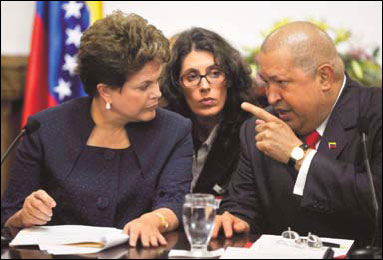Venezuela's Chavez to host new Americas summit
Updated: 2011-12-03 07:53
(China Daily)
|
|||||||||
|
Venezuelan President Hugo Chavez (right) talks with his Brazilian counterpart Dilma Rousseff (left) during a signing ceremony at Miraflores presidential palace, in Caracas, on Thursday. Thirty-three Latin American and Caribbean heads of state were to meet on Friday for a summit hosted by Chavez. Juan Barreto / Agence France-Presse |
CARACAS, Venezuela - Venezuelan President Hugo Chavez is set to open a summit on Friday for a new Americas bloc that does not include the United States and Canada - his first big international event since being diagnosed with cancer.
Chavez hopes the Community of Latin American and Caribbean States (CELAC) - an alliance of 33 countries from Colombia to Ecuador - will be a counterbalance to US influence in the region.
The two-day summit comes amid strong regional growth, with many countries developing closer ties with Asia or Europe and reducing their traditional reliance on the United States.
Regional leaders proposed the new grouping in February 2010 in Mexico, more than 60 years after the start of the Organization of American States (OAS), which is based in Washington and excludes Cuba.
"The creation of CELAC is a demonstration of the region's self confidence and growing desire for independence with regard to the United States," said Cynthia Arnson, director of the Latin America program at the US-based Wilson Center.
The summit comes as many countries celebrate 200 years of independence and a month after an Ibero-American summit in Paraguay.
But questions remain about the role the fledgling grouping will play in the diverse region, given the current crisis in the European Union.
Chavez and his allies see CELAC as a step toward realizing the dream of Latin American unity of Simon Bolivar, the 19th century Venezuelan military and political leader who played a key role in South America's independence struggle.
The meeting "had to be in Caracas, the Caracas of Bolivar, where the unity of the people of Latin America and the Caribbean was born", Chavez said recently.
But analysts rejected suggestions of a great leap forward or immediate threat to the US-based OAS, which Ecuadoran President Rafael Correa suggested will be "replaced" by CELAC.
"The OAS, with all its problems, is an institution," said Peter Hakim, president emeritus of the Inter-America Dialogue think tank in Washington.
"It has a leader with clear, if insufficient, authority. It has clearly defined purposes and principles to guide it. Its procedures are in place. And it has a budget - most of which comes from the US and Canada," he added.
The first CELAC summit "needs to send a message of Latin American unity and regional integration, without pretending to replace what already exists", said Milos Alcalay, Venezuela's former ambassador to the United Nations.
Brazilian Alberto Pfeifer, executive director of the Business Council of Latin America, said "CELAC is not a priority" for Brazil's government in the same way as UNASUR - a 12-member union of South American nations with a focus on business, infrastructure and defense.
The first meeting of CELAC was initially scheduled for July, but delayed after Chavez was diagnosed with an undefined cancer.
For Chavez, CELAC "is about how to put 'the imperialism' (of the United States) in its place, but the question is to see what the other heads of state think", said Venezuela-based political analyst Jose Vicente Carrasquero.
Agence France-Presse












